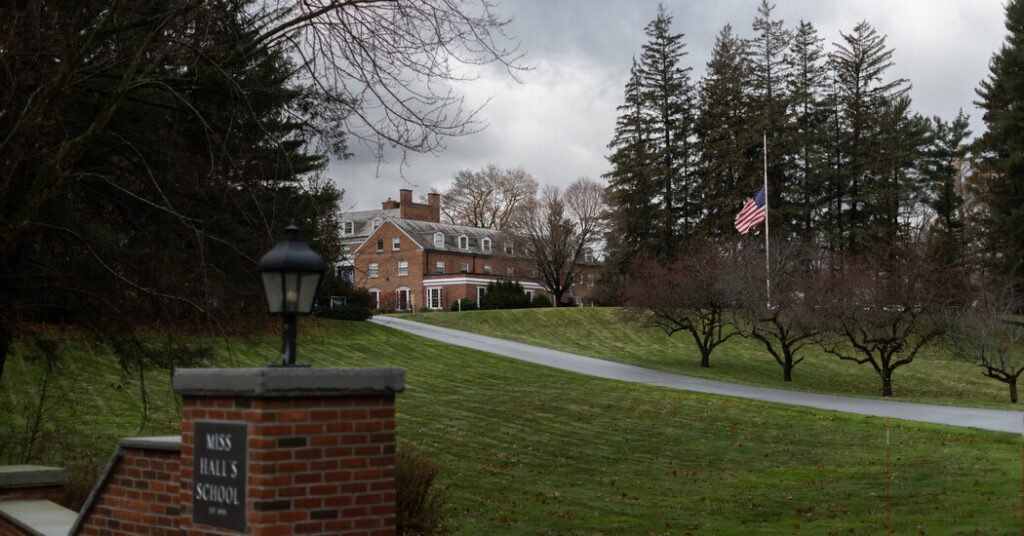At 15 years old, Melissa Fares enrolled at Miss Hall’s School, a private boarding school in the hills of western Massachusetts. Not long after, she said, a charismatic, respected teacher and coach at the school began to pay her special attention, sharing secrets and private study sessions.
After she turned 16, the legal age of consent in Massachusetts, the teacher, Matthew Rutledge, capitalized on the intimacy he had cultivated, Ms. Fares said. In most states, what happened next — a teacher having sex with a 16-year-old student — would qualify as sexual abuse, or even rape.
But not in Massachusetts, where state law says children as young as 16 are old enough to consent to sexual activity with adults, even if those adults are their teachers.
A law firm hired by the all-girls school substantiated allegations that Mr. Rutledge had abused five girls over 20 years. The school has apologized and settled legal claims brought by some women. Mr. Rutledge resigned last year.
But he has not been charged with a crime. Prosecutors have said their hands are tied because of the Massachusetts consent law.
Mr. Rutledge declined through his lawyer to comment on the allegations.
Many states updated their consent laws after sexual abuse scandals involving priests, coaches, teachers and doctors changed the public’s understanding of how power differentials operate in sexual relationships. Most states now explicitly bar teachers from having sex with teenage students.
But in Massachusetts and 10 other states, legislators and advocates say, existing laws create a legal loophole that lets sexual predators get away with abusing and assaulting minors by allowing them to claim consent was given for their actions.
Now, in the wake of the law firm’s report, released over the summer, Ms. Fares and another former student, Hilary Simon, are pushing the state to change the law. They have asked legislators to pass a law that would declare students incapable of consenting to sexual relationships with teachers or other people in positions of authority over them, to acknowledge the imbalance of power in such relationships.
“He used his position of power to gain constant access to me, to cut me off from friends, trusted adults, even my family,” Ms. Simon said, describing her abuse by Mr. Rutledge in testimony before legislators in June. “For more than 30 years, this man preyed on students — why? Because he knew he could. He knew that the law offered cover.”
Mr. Rutledge resigned from his position at Miss Hall’s, in Pittsfield, Mass., in March 2024, after a lawyer for one former student notified the school of allegations of misconduct. An investigation by the Pittsfield police followed.
But the police and the Berkshire district attorney’s office concluded last October that Mr. Rutledge had not committed any crime. “Massachusetts law defines the age of consent as 16,” Timothy J. Shugrue, the Berkshire district attorney, said at the time. “While the alleged behavior is profoundly troubling, it is not illegal.”
The finding touched off outrage in rural Berkshire County, and among some Miss Hall’s alumnae. Founded in 1898, the school enrolls about 200 students in grades nine through 12 on its scenic campus near the New York line, 130 miles west of Boston.
Since then, more information has come to light. Trustees at Miss Hall’s hired a law firm last year to conduct an independent investigation of misconduct at the school. The result was the 60-page report released in August. The investigators concluded that Mr. Rutledge had abused at least five students over 20 years and that school leaders had repeatedly failed to investigate third-party reports of his misconduct.
According to the report, Mr. Rutledge’s offenses against his students included “grooming behavior, sexual advances, sexual touching, and forcible oral and vaginal intercourse,” as well as other forms of sexual conduct. Ms. Fares has said Mr. Rutledge first had sex with her under a table in his classroom, and later on a yoga mat laid out on the floor of his classroom closet — abuse that continued for years.
A spokeswoman for the Berkshire district attorney said on Monday that the investigation of Mr. Rutledge had remained open and active since the initial decision not to charge him. After the release of the law firm’s report, she said, the office assigned a team to review the findings, which were based on nearly 150 interviews.
The report also substantiated claims of abuse carried out by seven other former employees at the school, spanning decades. And it included accounts of behavior that might fit the legal definition of rape, regardless of age. One student said that when she had stayed at Mr. Rutledge’s house, she had awakened to him having sex with her.
Mr. Rutledge could yet face criminal charges based on such new information, the district attorney’s spokeswoman, Julia Sabourin, said.
As the case continues to unfold, the testimony of Ms. Fares and Ms. Simon has spurred new interest in legislative reform in a state where several previous attempts to change the law have petered out in the crush of other business.
The two women, now in their 30s, decided to speak publicly in part to try to change the law by describing how a bucolic school setting, presumed to be safe, had exposed them to years of harm while other adults on campus missed, ignored or dismissed the warning signs.
Speaking before the state legislature, Ms. Fares described how her teacher had visited her family’s home, where he curried favor with her parents by bringing them gifts. She also described the panic attacks, night terrors and depression she still struggles with, years after the end of the abuse.
“Massachusetts expects a 16-year-old to say ‘no’ to someone who is like a parent, who holds power over their grades, their college recommendations and their social freedom,” she said. “The next generation needs the protection we never got.”
In an interview, Ms. Fares said it had taken her years to fully understand that she was not at fault for what happened. It was only after she had met Ms. Simon and heard her story, Ms. Fares said, that she realized that school leaders had heard about misconduct by the teacher years before he victimized her. “This didn’t have to happen to me,” she said. “They could have done the right thing.”
The school has settled legal claims filed by some survivors of abuse and has made policy changes including new staff training, investigative processes and rules on where and how students and teachers can meet.
“We would not know the full extent of this harm if it weren’t for the courageous Survivors who came forward,” school trustees wrote in a letter to the school community. “We are profoundly grateful to these individuals, and we are simultaneously deeply sorry for all they endured.”
Joan Lovely, a state senator from Salem, Mass., and a leader of the effort to change the law, said it was hard to fathom why previous attempts had failed, given that the change would cost little, if anything, and that she had heard no opposition.
“It’s been a matter of educating legislators and the public,” she said. “People don’t want to believe that something like this could happen. But the culture has changed a lot.”
High-profile cases in recent decades, including the abuse crises in the Catholic church and in high-level women’s gymnastics, have changed the public understanding of what constitutes consent. A host of new laws have followed, governing the conduct of not just teachers but members of the clergy, therapists, doctors and other professionals who are responsible for the welfare of vulnerable people.
“There’s a lot that’s happening that’s changing the way people think about power and sexual relations,” said Deborah Tuerkheimer, a law professor at Northwestern University who focuses on domestic and sexual violence.
Leigh Davis, a freshman state representative from Berkshire County, where Miss Hall’s School is located, said she had heard deep concern about the case from voters as she campaigned last fall. Residents were troubled by the abuse, and by the lack of charges against the teacher accused.
“People were really, really upset by it,” she said. “They were saying, ‘We need to do something about this.’”
Ms. Davis introduced her own bill in the State House to criminalize sexual contact between school authority figures and students regardless of age; the legislation would also require schools to develop policies aimed at preventing such misconduct.
Mr. Shugrue, the Berkshire district attorney, has endorsed the legislation, as have other district attorneys in the state, and Gov. Maura Healey has said she will sign it if it passes.
“It feels like this could be the moment,” said Ms. Lovely, the state senator. “And it’s because of survivors coming forward, saying, ‘This happened to me,’ and the public really seeing the problem.”
Jenna Russell is the lead reporter covering New England for The Times. She is based near Boston.
The post Students Accused a Teacher of Sexual Abuse. Prosecutors Say They Can’t Charge Him. appeared first on New York Times.




